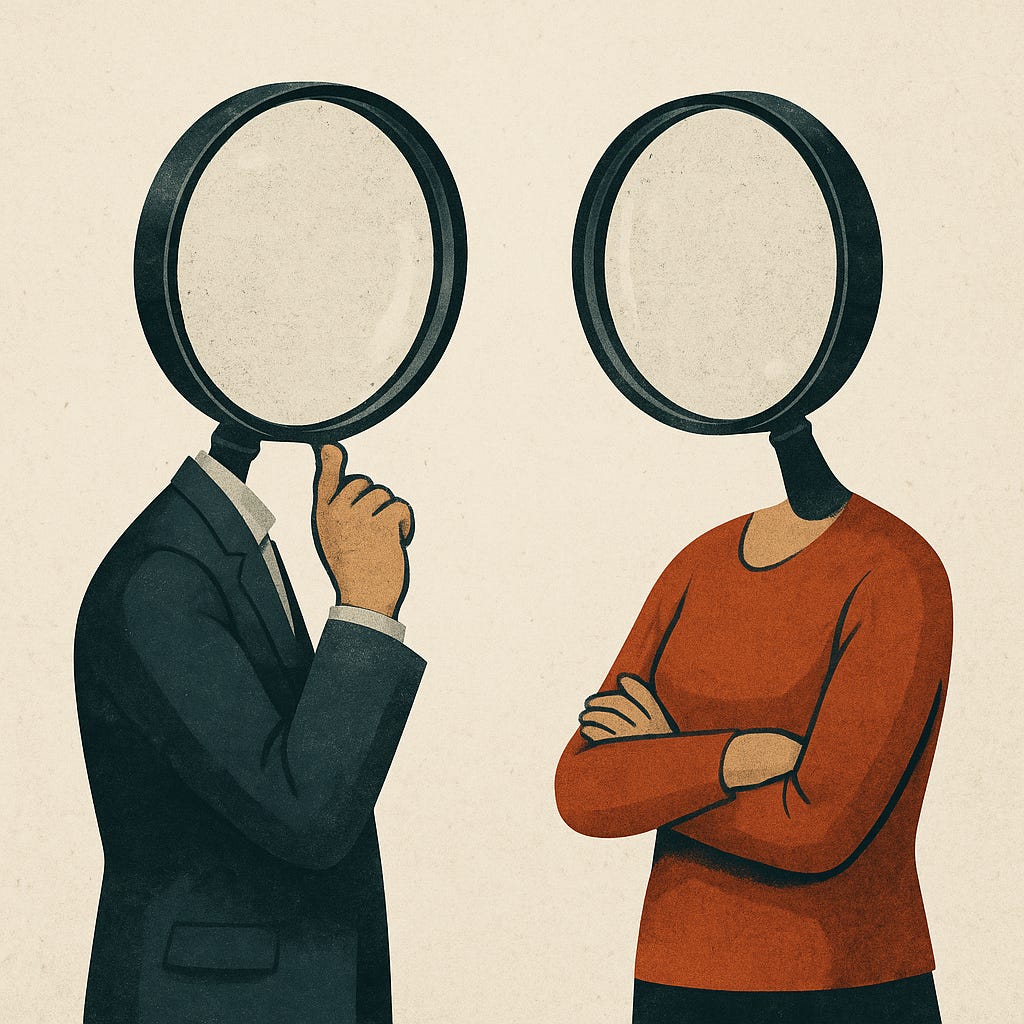You’re not debating truth. You’re bumping into someone’s defence mechanism.
Everyone thinks they’re seeing the truth. What they’re actually looking at is a trauma-filtered mood board wrapped in moral certainty.
What if no one’s actually wrong. Just traumatised in different directions?
That’s the bit no one likes to admit. Not in therapy. Not mid-argument. Not even when they're two wines deep and crying in the kitchen. Because it's easier to call someone toxic than to admit you're clashing with a reality shaped by someone else's damage.
People don’t see the world as it is.
They see it as it hurt them.
That’s not philosophy. That’s Monday morning at the post office when someone loses their mind because you looked at them.
You weren’t rude. Fuck, you weren’t even interested. But somewhere in their twisted little neural Rolodex, your expression matched the one their dad wore the day he walked out.
And now it’s war.
You can dress it up in psychology, astrology, or whatever self-help fluff is trending this week, but it all boils down to this.
No one’s having the same conversation.
They don’t hear what you said. They hear what someone like you said once. They don’t see your face. They see a threat profile shaped by twenty years of betrayal, passive aggression, and one bad acid trip in Ibiza.
You’re not a person, you’re a trigger in a trench coat.
And everyone is doing the same bloody thing.
You think you’re intuitive. You think you’re perceptive.
What you are is paranoid, with better storytelling skills.
You feel a vibe and call it insight. You get a gut feeling and treat it like gospel.
But really, you’re just filtering the present through a cracked windscreen full of old heartbreak and unprocessed therapy notes.
Nobody’s seeing each other.
Most conversations aren’t even dialogues. They’re duels.
You’re not listening. You’re loading. Rephrasing your retort while they’re still mid-sentence.
And they’re doing the same. So what you get is a cold war.
It’s not about being understood. It’s about not being wrong.
God forbid you say, “I don’t think of it like that.”
That’s social suicide. Might as well hand over your spine and join a yoga cult.
Instead, we wrap insecurity in certainty. We coat fear in sarcasm. We fire empathy through a loophole in our defence system, just enough to look human without ever being vulnerable.
You say, “I feel like you don’t listen.”
They hear, “You’re a failure.”
You say, “I need space.”
They hear, “I’m leaving.”
You say, “Let’s talk later.”
They hear, “You’re not worth my time.”
They’re not hearing your words. They’re hearing the subtext they expect to find.
The tone their mother used. The silence their ex weaponised. The sigh that meant everything was about to go to shit.
So they go on the offensive.
And you go quiet.
Or you both explode, politely. With passive-aggressive phrasing and emotionally neutered syntax.
Because being right now matters more than being close.
They say we grow up.
What they mean is we get taller, more passive-aggressive, and better at hiding the panic. Nobody really grows up. They just get better at pretending they’re not still waiting for someone to love them the right way.
You think you’re arguing with a forty-year-old woman.
You’re not.
You’re arguing with a five-year-old girl who learned that crying made her father leave the room.
You think you’re negotiating with a man.
Nope.
You’re speaking to a twelve-year-old boy who decided vulnerability was a liability the moment someone laughed at his fears.
It’s all still there. Just dressed in grown-up language and job titles. Emotional toddlers doing PowerPoint presentations on why they’re not the problem.
Most people are reacting, not responding.
Triggered by tone. By timing. By anything that feels even slightly like abandonment or shame or powerlessness.
Not because they’re dramatic. But because their nervous system never got the memo that it’s 2025 and they’re allowed to use their words now.
So they scream with silence. They punish with distance.
They manipulate without even knowing it, because to them, this is communication. This is connection. This is how love worked growing up, and that’s all they’ve got.
And we are all doing it too.
The idea of closeness? Probably forged in chaos.
The idea of trust? Shaped by who betrayed you first.
The ability to listen? Filtered through ten layers of “how does this threaten me?”
No one’s clean. No one’s untouched. We’re all haunted by something.
You can't argue someone out of their lens. You can't logic them into a new childhood. You can't PowerPoint your way through someone else's trauma and expect applause at the end.
You have to look. Properly. Not with judgement. With intent. With the kind of brutal patience that says, “I don’t agree with you, but I’m trying to see what you’re seeing.”
Because once you do that, it starts to make a horrible kind of sense.
You realise they weren’t being cold. They were scared.
They weren’t controlling. They were terrified of being abandoned.
They weren’t angry. They were hurting in a language they never learned how to speak.
People don't broadcast their truth. They broadcast their protection.
Every sentence a smoke signal. Every silence, a survival tactic.
You have to read between the shrugs and the sarcasm and the “I’m fine”s they’ve learned to weaponise.
But understanding doesn’t mean agreeing.
It does mean you stop setting fire to every bridge because someone’s worldview doesn’t match yours.
You think the relationship is breaking because of the disagreement.
It’s not.
It’s breaking because neither of you can stop defending your view long enough to actually see the other person.
Most people aren’t unreachable. They’re unread.
And if you don’t want to keep playing emotional whack-a-mole with your relationships, you’ll need to learn the difference.
Once you understand how people see the world, you can speak directly to the part of them that answers without thinking. You’re not having a conversation anymore. You’re writing their half of it for them.
Mirror their rhythm. Match their tone. Echo their values. And you’ll watch their suspicion melt like bad wax. It’s a pattern-recognition game where the prize is access to their emotional vault.
That’s what makes it so dangerous.
Because when you speak someone’s language before they realise they’re even listening, you’re not talking to their adult self. You’re whispering straight to the child. The one still trying to earn love. The one who flinches when voices get too loud. The one who confuses agreement with safety.
You can bypass logic entirely. You can short-circuit defences they didn’t know they’d built. And all you had to do was act familiar. Be just believable enough to slip past the firewall.
Used ethically, this can be a form of radical understanding. A way to create space where people feel seen without having to perform.
Used poorly, it's emotional identity theft.
You’re not just building rapport. You’re shaping perception. You’re editing the lens they use to judge if they’re safe.
And when people feel safe, they get sloppy. They confess too much. They trust too fast. They follow where they’d normally question. Because they think you get them. Not because you do, but because you’ve copied and pasted their patterns so well they forgot to look up.
This is not about becoming manipulative.
It’s about recognising that you already are.
So you might as well learn how it works, before someone with worse intentions uses it on you first.
So now what.
You know everyone’s walking around in a story. Yours. Theirs. Recycled ones they inherited from people too broken to edit the script. And every conversation is just two people trying to convince the other that their hallucination is the real one.
You can steer someone just by matching their rhythm. Mirror the right fear and they’ll follow you like it’s free will. No hypnosis needed. Just familiarity. That’s the trick. Bypass the conscious. Speak to the patterns.
Use it to manipulate, if you’re the type. But know this. It works because people want it to. They want their story confirmed. Their lens justified. Their pain echoed.
This isn’t control. It’s clarity.
Start there. Watch how people speak when they’re afraid. Watch how they defend beliefs that never belonged to them. Watch how they rewrite your intentions before you’ve even finished the sentence.
You don’t need to fix it. Just notice it.
And then decide. Step in, or step away.
Because once you see the lens, you stop mistaking it for reality.
And once you stop performing for their comfort, you start connecting for real.
Tomorrow, we need to talk about what happens when you show someone who they really are. And they hate you for it.




Too often, people duel instead of debating. They don't seek truth, rather they seek to win.
They say, "Can't you handle any criticism?", but their criticism was not constructive criticism. It was an attack as a result of their own emotional problems.
Your article is discussing one of the biggest and most important things that humans need to improve. Therefore it should receive 100,000 likes.
Unfortunately, we know it won't. Humans need to address these important problems instead of sticking their heads in the sand all the time.